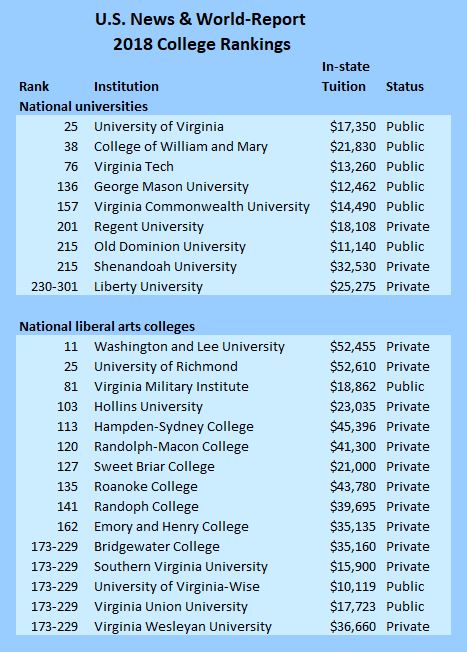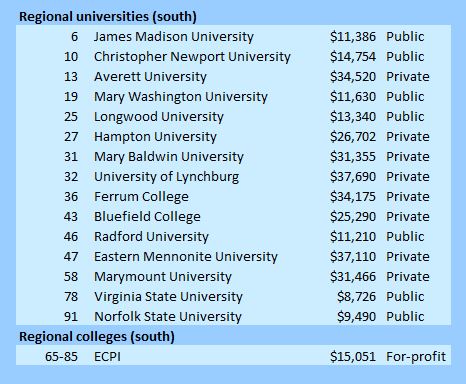Oh, my, U.S. News & World-Report has just published its Best College rankings for 2018. Poring through college rankings is like slowing down on the Interstate to check out a car wreck — you know you shouldn’t do it, and you know it’s a waste of time, but you do it anyway. So, for your viewing pleasure, here are the rankings for Virginia’s public universities:

Corrections: Mary Washington University should read “University of Mary Washington.” The tuition at Hollins University is $39,035.

What stands out to me is the marked contrast in tuition levels at public and private institutions. The sticker price for public institutions is significantly lower that for the privates. On average Virginia’s public universities charge $13,575 in tuition and fees. On average the privates charge $33,650. (These expenses do not include room, board, textbooks or other expenses.)
Of course, there is a world of difference between the list price and the “net” price after institutionally provided financial aid. Wealthy private schools with big endowments such as Washington & Lee University and the University of Richmond can afford to knock their prices way down for select groups of students, but others are hard pressed to compete.
If your kid wants to go to a southern regional university, where would you prefer to send him or her — to Mary Washington (ranked 19, tuition $11,630) or Mary Baldwin (ranked 31, tuition $34,140)?
I’ve spilled much digital ink on this blog worrying about the public institutions pricing themselves out of the market. I still think there is abundant reason for concern. But my analysis heretofore has not given sufficient weight to the extraordinarily high cost of the private colleges. As families become ever more desperate to hold down the cost of attendance, more will change their preferences from private to public, in effect creating a safety valve for the publics.
The Commonwealth provides a small subsidy for Virginia students attending private Virginia colleges, but not enough to noticeably close the gap. The private schools can pitch their small class sizes and close teacher-student relations all they want, but they are selling to a shrinking market. I wonder how many of them have a long-term future.
Update: If college administrators aren’t going into panic mode, they should be. Glassdoor, the job search blog, reports on 15 major companies – including Google, Apple, Starbucks, Costco, Whole Foods, Hilton and Publix — that are relaxing their college-degree requirement for many higher-paying jobs. When big employers stop using college diplomas as a credential, they start looking for specific competencies, not degrees. And that spells disaster for colleges selling credentials.
As I’ve been researching the family/corporate history of the A.T. Massey Coal Company in my paying gig, I’ve been struck by the number of business leaders who emerged in the first half of the 20th century with little higher education. The lack of a college degree did not stop them from becoming successful business leaders. They supplemented on-the-job learning with night school to acquire specific skills they needed.


